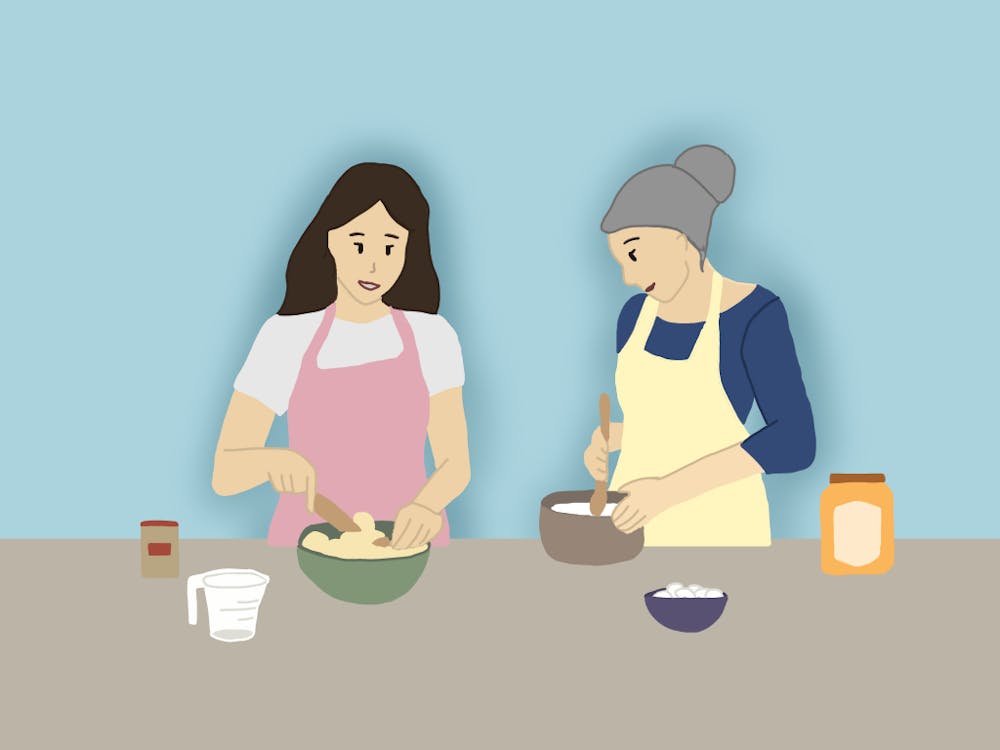In a small room of 1512 JPA, first-year College student Zo Chen stands in the middle of a semicircle. Dressed in active wear, hands stuffed in her pockets, she stands casually, unpretentious and youthful. Then, as the seconds pass, the background music from her surrounding group members escalates, finally introducing her voice. She belts out a throaty Chinese song, which translates to mean "The Everlasting Scene," singing the words with ease and confidence.
It is another night of practice for O-Tones, an East Asian, co-ed a cappella group at the University that meets twice a week for two hours a time. Tonight, more than 10 people crowd the small room and excitedly practice their songs, which range from Chinese pop to "Take Me There" by R & B artist Mya.
It was only a few years ago that no such group existed on grounds. Fourth-year College student Michelle Chen, who founded the O-Tones, has a hard time remembering when things were different, but it was her initiative in the year 2000 that got the group started. "Just coming here and listening to a cappella, I fell in love with it," she said. "But I felt we were missing an Asian group."
An international student from Jordan who is Taiwanese by birth, Chen allowed her idea to take flight after witnessing the enthusiasm of other Asian students at the University about starting such a group.
"The response from Asians was really encouraging," Chen said. "At the beginning I was alone with my idea."
Eventually more than 20 students expressed an interest in auditioning, and Chen assembled a group of between 12 and 16 singers for her new a cappella group, the O-Tones.
Ektaal, an equally prominent ethnic a cappella group at the University, also has recent origins. Translating to mean "One Beat" in the Indian language Hindi, Ektaal is a South Asian female group that today boasts more than 10 singers.
Although the ladies are of different backgrounds
- some international students born in foreign countries, others U.S. citizens
- they convene eagerly for practices three times each week with a common interest and love for music.
Kalsoom Lakhani, a third-year College student who describes herself as half Pakistani and half Bangladeshi, is the proud president of this diverse South Asian group.
An international student from Pakistan who speaks two very different Indian languages, Lakhani came to the University with a deeply rooted love for all music.
"I think music is really my passion," she said. "I sang a lot in school. Because I went to American schools I was never given classical [Indian] training. I was trained as a choral and a pop singer."
Singing since the age of 11, Lakhani has no problem belting out Madonna's "Like a Prayer" during the group practice Thursday night. She equally enjoys singing the South Asian pieces in the group's repertoire.
"I am very Americanized but I am also very in touch with my culture," Lakhani said. "That's the whole beauty of Ektaal
- it's a fusion of both musics."
Lakhani's says her appreciation for Ektaal's uniqueness as a performing a cappella group motivated her to seek new challenges for the organization.
"I really wanted the group to go somewhere," she said. "I felt we were stuck in a rut and needed more goals."
Her search for these goals led her to Penn Masala, an internationally renowned Indian a cappella group that started at the University of Pennsylvania in 1996. As a result of Lakhani's determined endeavors, Penn Masala, a group that typically charges around $10,000 per performance, came to the University this fall to perform.
The opening act of their much-publicized show was Ektaal, and the ladies were ready to project a positive image of their group to the avid audience.
"My big brainstorm idea was to bring this big a cappella group," Lakhani said. "We sold donuts, we sold CDs. We're still in debt right now. But I think it was the best thing that has happened to me."
And the group is still reaping the benefits of the big night.
"It's already opened up lots of goals for us that weren't open before," she said.
The ladies plan to showcase the results of these goals this upcoming weekend, when they hit the road to perform at Duke University with a number of other a cappella and dance groups from schools in the area. Two weekends following that act, they will perform at Virginia Tech.
As both Ektaal and O-Tones gain prominence in their respective ethnic circles, group members seek to connect with the University community at large.
Third-year Commerce student and O-Tones President Ann Cheng finds there is still work to be done in getting their name out.
"I know we're not as well-known," she said. "There are people in other a cappella groups who have never heard of us before."
In her initial quest for an Asian a cappella group, Chen found other Asians to be very interested in the idea. But today she finds the group's concerts proliferated with different faces, a fact that pleases her.
"[Non-Asians] actually have a very strong interest in Asian culture. It's so cool to see their faces in the audience," she said. "We are giving and taking. People hear our Asian songs and they want to go download them at home."
Fourth-year College student and Ektaal member Ishita Arya has seen the group develop since she joined during her second year.
Recently they became a Contracted Independent Organization, which gives them the opportunity to sing at many University events, including the annual Rotunda Sing.
Arya initially found Ektaal was better known in the Indian community.
"A lot of our struggle at the beginning was just publicity," she said. "We do a lot of non-Indian performances now, that are just U.Va. and not geared toward Indian viewers."
Arya says the positive feedback she has received from non-Indians and Indians alike ties back to the group's diverse song repertoire, she believes.
"We try to keep it half English and half Indian, and I think we have," she said. "Most of them we mix."
An example of the creative mixes they arrange is the piece they practiced Thursday evening
- a compilation of Madonna's "Like a Prayer" with "Eli Re Eli," a song from the Hindi movie "Yaadein."
As a fourth-year student preparing to graduate, Chen looks back fondly at the origins of O-Tones, and also at how far the group has come. She remembers, for instance, the time the group performed four songs that she herself composed and harmonized.
And she also will remember the professional recording the group did just last weekend, immortalizing their efforts on a CD.
"I have met the greatest people through this group, people I would not have met otherwise. I got very lucky," she said. "I feel like I have accomplished so much at this university."






